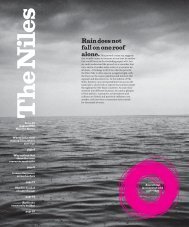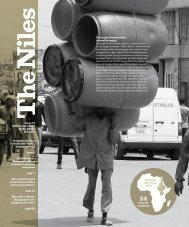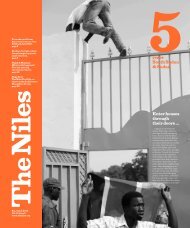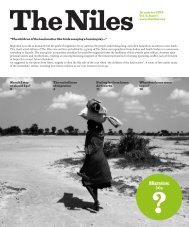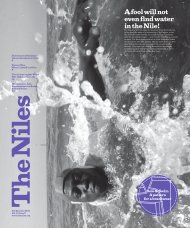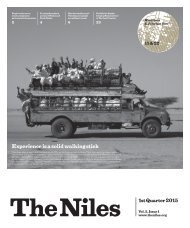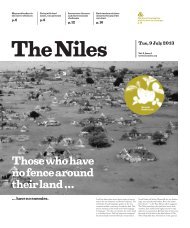When deeds speak, words are nothing
Speaking about sustainable development is easy. Acting sustainably is another matter. And now the evidence is unequivocal: Mankind’s impact on nature is causing the climate to change rapidly and drastically, threatening the environment and the very resources we need to survive. Aware that humanity is careening close to the edge, The Niles correspondents set out to explore where and how people in the Nile Basin region rethink. So much of their findings for now: We are an endlessly innovative species. Cooperation is our superpower. When deeds speak, words are nothing.
Speaking about sustainable development is easy. Acting sustainably is another matter. And now the evidence is unequivocal: Mankind’s impact on nature is causing the climate to change rapidly and drastically, threatening the environment and the very resources we need to survive. Aware that humanity is careening close to the edge, The Niles correspondents set out to explore where and how people in the Nile Basin region rethink. So much of their findings for now: We are an endlessly innovative species. Cooperation is our superpower. When deeds speak, words are nothing.
You also want an ePaper? Increase the reach of your titles
YUMPU automatically turns print PDFs into web optimized ePapers that Google loves.
Wetlands:
A vital tool
to mitigate
climate
change
re<think
40
the way we use land
M
Wetlands can put the brakes on the
impacts of climate change. The case
of the Rweru-Bugesera wetland shows
why it’s high time we do more to
protect them.
Fabien Niyonizigiye
Bujumbura, Burundi
ost of Burundi’s internally displaced people
were not displaced by conflict but by climate
change. In the East African country, the
consequences of climate change have forced
more than 100,000 people to flee, according
to Save the Children.
In East Africa, there has been an increase
in frequent extreme weather conditions, such
as persistent heavy rainfall. Therefore, there has
been a spike in flood disasters in recent years,
and Burundi is particularly affected.
The sharp difference in sea surface temperatures
between the western and eastern
areas of the Indian Ocean is to blame. The
waters around East Africa are now about two
degrees Celsius warmer than those of the
eastern Indian Ocean near Australia.
In an unpublished report by the Intergovernmental
Panel on Climate Change (IPCC),
obtained by the AFP news agency, UN climate
experts predict that floods in Africa will displace
2.7 million people a year in the future.
By 2050, 85 million people are likely to become
climate refugees.
As a result of climate change, the Nile Basin
can expect changes beyond anything previously
experienced. Healthy ecosystems, like wetlands,
offer many opportunities to help adapt and
manage some of these changes.
The ecosystem services provided
by wetlands
Wetlands are valuable environmental assets
and play a vital role in controlling floodwaters,
reducing erosion, improving water quality and
serving as habitats for diverse plants, animals
and microorganisms.
Wetlands around the shores of rivers and
lakes provide, for example, essential areas for









